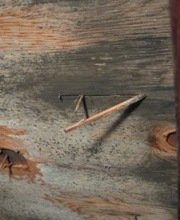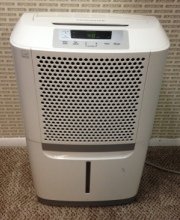Find a Mold Specialist Now
Click or Call, Toll-Free 24/7
Best Basement Dehumidifiers
Are you wondering about the best basement dehumidifiers? When choosing the right dehumidifier, basement areas call for extra attention because they are often large spaces and they may be damp or prone to mold. We'll tell you how to select the best dehumidifier for your basement.
Do You Need a Basement Dehumidifier?
If you're asking the question, chances are you do need a dehumidifier for your basement. Still, we'll provide some additional information to help you with your decision.
If you answer yes to any of the following questions, most likely you will benefit from a good dehumidifier in your basement.
- Does your basement smell musty? The musty odor characteristic of mold is caused by gasses some strains of mold produce called microbial volatile organic compounds. That smell is an indication of mold and any mold needs to be removed, but a good dehumidifier can help prevent future mold growth.
- Do you have a washing machine and clothes dryer in your basement? Doing laundry increases humidity, which increases the risk of mold growth.
- Does your basement feel damp? Do you ever notice moisture on the walls or floor?
- Does the basement feel humid or stuffy?
- Have you discovered any mold in your basement?
- Is the relative humidity too high in your basement? Read on for more information about that!
Is the Relative Humidity Too High in Your Basement?
If you're wondering what relative humidity is and how you'd know if it is too high, don't worry. We'll explain.
Relative humidity refers to the amount of moisture in the air. Technically, it's a measure of how much moisture is currently in the air compared to how much moisture the air could hold at its current temperature. Relative humidity is expressed as a percentage. The U.S. Centers for Disease Control and Prevention (CDC) recommends keeping the relative humidity in your home below 50 percent in order to reduce the risk of mold and suggests using a dehumidifier as needed in order to do that. According to the CDC, that's one of the best ways to avoid exposure to potentially harmful household mold.
How do you know if the relative humidity in your home is greater than 50 percent? You can install a simple device called a hygrometer. They usually run on batteries and you can put them anywhere in the home you like. A hygrometer measures and displays the relative humidity in a room, much like a thermometer measures and displays the temperature. You can read more about home hygrometers here.
If you decide you need a dehumidifier for your basement, having a hygrometer will let you know if the dehumidifier is working as expected.
Choosing the Best Basement Dehumidifier
The best basement dehumidifiers reduce relative humidity, making basements more comfortable, preventing mold, and protecting furnishings and other items stored there. In a moment we'll tell you which dehumidifiers we like best for basements but first we want to talk about what to look for in a basement dehumidifier.
It's important to choose the right size dehumidifier. The size you need depends in part on how big your basement is, so you'll need to know how many square feet it is. If you don't know this number, just measure the length and width of your basement and multiply those numbers to get the square footage. You should also take into consideration how damp your basement is. If your basement is very damp, you'll need a larger dehumidifier. Click here to view a chart that will help you select the right size dehumidifier.
If your basement floor has a drain, you can select a dehumidifier with a continuous drain option. You'll just need to place the dehumidifier near the floor drain. Then you won't have to worry about emptying a water collection bucket every few days.
Some of the best basement dehumidifiers include air filters that remove dust, mold particles, and other debris from the air. Look for one of these, especially if you or any family members have asthma or environmental allergies.
The Best Basement Dehumidifiers
The best dehumidifiers we've found for basements are those made by Frigidaire. They are available in a range of sizes, suitable for large and small basements and everything in between. Frigidaire offers dehumidifiers with a continuous drain option and many carry the Energy Star rating, meaning they operate efficiently and save you money on home energy costs. Follow the links to learn more about the top recommend basement dehumidifiers.
Return From Best Basement Dehumidifier To Our Main Dehumidifier Page
Ref:
CDC - Decreasing Mold Exposure
Privacy Policy Terms and Conditions Accessibility Do Not Sell My Information Disclaimer Contact Us





